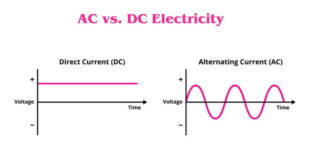Potentiometer Circuit Diagram and Working Introduction Potentiometers, also known as variable resistors, are a fundamental component in electronic circuits. They are used to control the flow of electrical current in a circuit by altering the resistance of the circuit. Potentiometers are widely used in various applications, such as volume controls …
Read More »Tag Archives: Electronics
What Happens if We Connect a Polar Capacitor the Wrong Way?
Answer: Connecting a polar capacitor the wrong way can lead to reverse voltage, causing the capacitor to fail catastrophically, potentially resulting in leakage, overheating, and even explosion. Reasoning: Polar capacitors, such as electrolytic capacitors, are designed to handle voltage in one direction. Connecting them the wrong way can subject them …
Read More »Types of Electricity: AC vs. DC
Types of Electricity: AC vs. DC Electricity comes in various types, and one common way to categorize it is based on the flow of electric charge. The two primary types of electricity are Alternating Current (AC) and Direct Current (DC). Let’s explore the characteristics and applications of each: 1. Alternating …
Read More »Does voltage or current cause heat?
Answer: Current causes heat. When current flows through a resistive material, it encounters resistance, leading to the generation of heat according to Joule’s Law (P = I²R). Reasoning: Voltage represents the force that drives current, and resistance impedes the flow of current. When current encounters resistance (R), it experiences a …
Read More »Why DC current is used to charge batteries, not AC?
Answer: DC current is used to charge batteries because batteries are designed to store direct current (DC) energy. Charging them with alternating current (AC) would require additional components like rectifiers, making the process more complex and less efficient. Reason: DC (direct current) is preferred for charging batteries due to its …
Read More »What Is The Output Voltage of a UPS? AC or DC
Answer: The output of a UPS (Uninterruptible Power Supply) can be either AC (Alternating Current) or DC (Direct Current), depending on the type of UPS. Most common UPS units provide AC output, while some specialized units can deliver DC output for specific applications. Reasoning: The output of a UPS (Uninterruptible …
Read More » Electrical Engineering World Wiring a Brighter Tomorrow!
Electrical Engineering World Wiring a Brighter Tomorrow!





